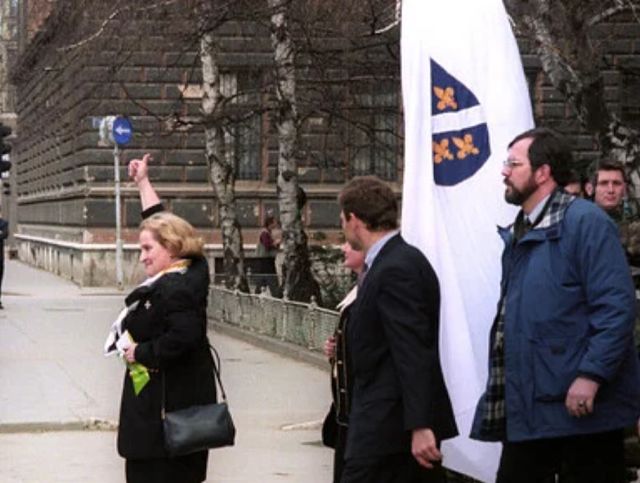Today’s anniversary of the American bombing of Yugoslavia coincided almost exactly with the death of former US Secretary of State Madeleine Albright, who initiated the bombing. There is a strong feeling in Russia, fueled by the fact that the “Russian world” they are now building is following the same pattern as the “Serbian world” that began in Serbia 30 years ago. They cannot forgive Albright for this.
However, many Muslims hold her responsible for the war in Iraq, which resulted in hundreds of thousands of casualties among the local population. This raises the question of whether Albright can be considered an enemy of all Muslims. The different reactions to her death in the Islamic world illustrate the complexity of this question.
Many Iraqis, Arabs, and those who share their perspective celebrate her death and wish her to burn in hell. On the other hand, Bosnian and Albanian Muslims express their condolences and recall how her decisions helped save them from genocide. For example, when the ancient Muslim city of Sarajevo, the capital of Bosnia, was besieged by the “Russian World” brothers, who starved and systematically killed its peaceful population through artillery and sniper attacks, Albright visited and campaigned for their support, saying, “I am a Sarajevan. The airstrikes on Serb positions, initiated by Albright and Joe Biden, established the same “no-fly zone” now being demanded over Ukraine and helped Bosnian Muslims turn the tide of the war. Similarly, the airstrikes on Yugoslavia, whose anniversary is today, protected Albanian Muslims in Kosovo from Serbian military terror. So while some Muslims curse Albright, others remember her with gratitude.
This sentiment extends beyond the Balkans – although the American actions in Iraq were criminal, many people there and among his Arab neighbors were relieved to see Saddam Hussein toppled because his regime was a threat to them. What conclusions can be drawn from this?
Someone recently asked why, in the confrontation between Russia and the West, we support the latter instead of working for the implementation of the Islamic project. However, only someone who is either unaware or deliberately ignores the numerous materials published on this website about the Islamic project and its problems and prospects, including the works of serious Islamic intellectuals, would make such a statement. It is impossible to reproduce all these materials in one article.
In summary, all projects aimed at creating a “pure Islamic state” without taking into account the realities of existing Muslim nation-states have failed. Attempts to destroy the existing global system and replace it with a new one have also failed. It is obvious that until Muslims succeed in addressing this issue on a global scale, the most realistic scenario for the collapse of the global system is a global conflict between non-Muslim world powers or a major natural disaster. In such an event, people may once again resort to fighting with swords, eliminating the technological advantage that currently prevents Muslims from becoming major league global players.
Until that happens, Muslims can either occupy their niche within the existing global order, whether in their nation-states or as minorities in non-Muslim countries, and choose their allies on the basis of policies that align with their interests, including religious interests and rights. Can Muslims seek greater global influence and independence from non-Muslim forces? Yes, but cautiously, as successful Muslim states like Turkey, Pakistan, and Malaysia have done by increasing their role and that of the Muslim factor. Is it worthwhile to rejoice in their achievements and to place hope in them? Yes, but with the understanding that if they bear fruit, it will be in the distant future and only if a cumulative effect takes place.
This requires the presence of several successful Muslim states and their alliances with such a strong gravitational force that they absorb all others as participants, allies and partners. Until this happens, each Muslim state defends its national interests first, sometimes sacrificing relations with non-Muslim allies for the sake of other Muslims. Is this undesirable? Of course it is. Should we try to correct it? Certainly we should. But we can only do so in the way I mentioned earlier. Until that happens, we must formulate our interests and build our policy within the existing coordinates. Do you have a better proposal? Demonstrate it in practice, not just in words.
(Photo: Madeleine Albright in Sarajevo)

